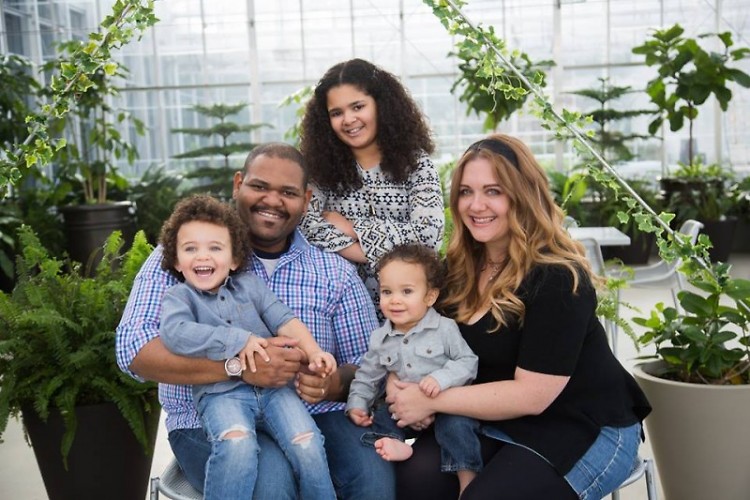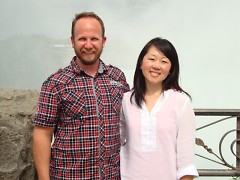It was a mere 51 years ago that Mildred and Richard Loving, an African American woman and white man, inadvertently and indelibly changed the landscape of love when they fought all the way to the Supreme Court for their right to be married. On June 12, 1967, Loving v. Virginia banned the last of the segregation laws against interracial marriage in the United States. Today, Loving Day is recognized nationally on June 12, and West Michigan's Loving Day Celebration will be held in Grand Rapids with a series of events from June 11 – 17.
For Edye Evans Hyde, executive director of Ebony Road Players, Loving Day has personal significance. As an African American woman married to a white man, the story of the Loving's resonates with her. She founded West Michigan's Loving Day Celebration as a way to celebrate the landmark Supreme Court ruling, in addition to using it as a vehicle to honor love in all forms. “Loving Day is not just about black and white. I hope to have people of all races, ethnicities, and sexual orientations showing up to say this is Grand Rapids.”
As an Asian woman married to a white man, I have experienced both the beauty and complexity of an interracial relationship, like so many others in our community. Here are just a few of our stories.
Alma and Attah Obande
For Alma and Attah Obande, Loving Day holds significance because, as Attah says, “Love shouldn’t be limited by race. If you have a connection with someone, why should you run away from that because of the color of your skin?”
He and Alma laugh about the first time they met and say that they “didn’t care for each other.” Assumptions they had made of one another, partially based on racial bias, shaped their first impressions. But after seeing each other again two years later, and after getting to know the true essence of who they are, they realized their original assumptions were wrong. Being part of an interracial relationship doesn’t make you immune from the trap of bias. Like any type of relationship, the journey can be clumsy, but beauty comes with the honesty and growth.
Today, Alma and Attah are married and raising their five children in a home that pays homage to both Attah’s Nigerian roots and Alma’s Mexican-American heritage. Their relationship was immediately embraced by their families, but hasn’t always been easy with others. Alma recalls a former friend insisting that she try online dating after she and Attah began their relationship, and she’s observed in restaurants how often their server will ask if they want separate checks. “This happens way more often than when I dated Latino men, like people assume we’re not in a relationship. It doesn’t seem like a big deal, but I’ll find myself asking, ‘Is this racism?’”
When asked about the joys of their relationship, Attah says it is learning about a different culture, and that they are very intentional about teaching their children both Nigerian and Mexican traditions. He says hearing stories from two different cultures has been a powerful experience for their kids. Alma says she and Attah are great examples of the transcendence of love. “Attah makes me happy, fulfills me, and there are so many dynamics to who he is. My parents said, ‘Be with who makes you happy.’ And I believe that. You should be with who you love.”
Courtney Myers-Keaton and Jason Keaton
For Courtney Myers-Keaton and Jason Keaton, life is busy, messy, and bursting with love for their three children: one-year-old Ezra, three-year-old Jedidiah, and 10-year-old daughter, Tanis. Daily life for Courtney, a white woman, and Jason, an African American man, also includes their reflections on parenting and the necessity of racial socialization with their children. Just recently, Jason and Courtney had ‘the talk’ with Tanis. “I, as her mother, will never be able to understand certain things because the world views me differently, so there are some things that I won’t be able to relate to. I will always listen and do my best, but I can’t make any promises that I will ever fully understand what it’s like to be in her shoes. ‘The talk’ is a real part of the black experience, but it’s more nuanced being a white person. I kind of wonder how much of this is my space and how much of this should be for Jason.”
Jason agrees that raising their children, with all of its joys, can be complicated. He says the world will view Tanis as black, but Jedidiah may be seen as white, and therefore, will give him different access and responsibilities. “Jed will have more of an empowerment role than his siblings, and the responsibility of leveraging that. He will have to make sure his siblings have a voice.” As a black male raising multiracial children, Jason says different scenarios also have different implications for him. He has to ask himself, “What kind of dad do I need to be? Do I need to be the protective, fearful dad right now?”
For Jason and Courtney, part of the beauty of their relationship is that it has changed how they view the world. Courtney says learning to be “comfortable with being uncomfortable” has helped expand her horizons, and she is better able to view the world through a different lens. She and Jason also feel that their kids’ experiences will help open them up to more opportunities, and they see their kids and their kids’ generation as changing the world for the better.
When asked about the importance of Loving Day, both Jason and Courtney say that we should always celebrate the ability to love who we want. “It’s not just about race,” Courtney says, “but also about LGBTQ. This is about the ability for anyone to love and be recognized, and not be ostracized by society for your choices.”
Shay Kraley and Jeff Hayes
My husband’s race and my race do not necessarily play a driving force in our relationship, but race is certainly always present. We deal with the difficulty of people’s assumptions about us, the microaggressions I can experience daily, and the privilege I try to navigate as a transracial Korean adoptee married to a white man. But because Jeff and I are able to have candid conversations with each other, we have developed perspective, empathy, and knowledge that we wouldn’t otherwise have. And for us, that’s the greatest part about being in an interracial relationship.
We believe Loving Day is important because our world needs love today more than ever. As Bishop Michael Curry recently said, “Think and imagine a world where love is the way. Imagine our homes and families when love is the way. Imagine neighborhoods and communities where love is the way. Imagine governments and nations where love is the way. Imagine this tired old world when love is the way.”
We want to see you at the fourth annual West Michigan’s Loving Day Celebration! Visit their Facebook page to learn more about the Loving Day events, June 11 – 17. As founder Edye Evans Hyde says, love in all forms will be celebrated here, and there is no better way to say This is Grand Rapids.
The Rapidian, a program of the 501(c)3 nonprofit Community Media Center, relies on the community’s support to help cover the cost of training reporters and publishing content.
We need your help.
If each of our readers and content creators who values this community platform help support its creation and maintenance, The Rapidian can continue to educate and facilitate a conversation around issues for years to come.
Please support The Rapidian and make a contribution today.



